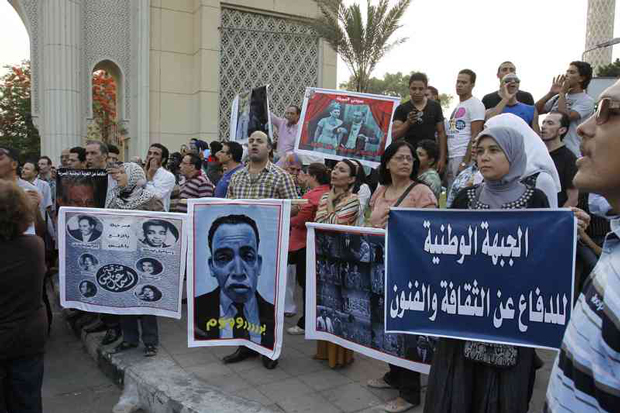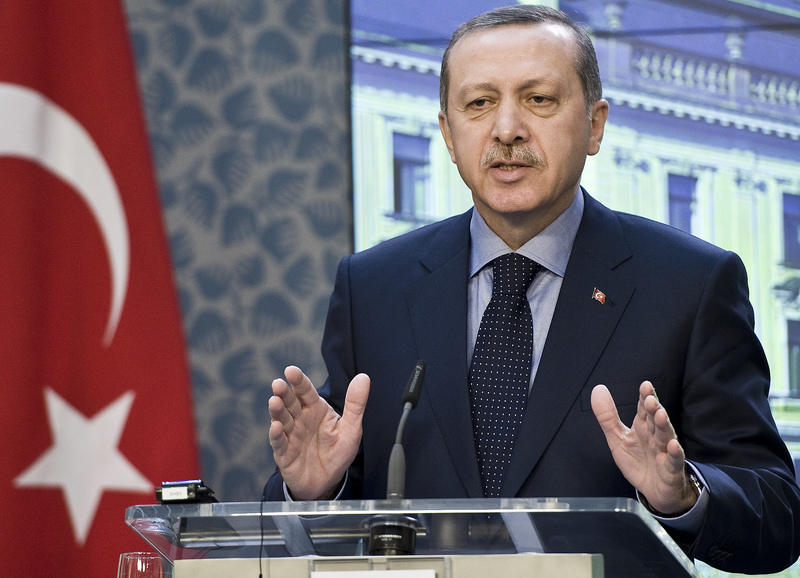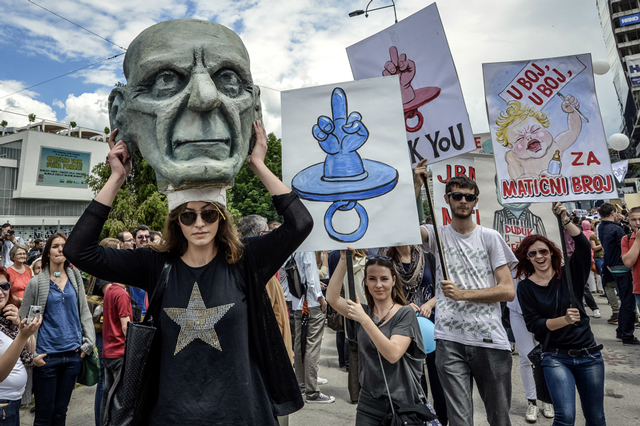28 Jun 2013 | Middle East and North Africa

Egyptian intellectuals hold posters and the Tamarod (Rebellion) petitions while chanting slogans during a demonstration against the Minister of Culture Alaa Abdel Aziz, in front of the opera house in Cairo. (Photo: Mohamed Elmaymony / Demotix)
Tensions have been building up in Egypt ahead of mass protests called for by opposition activists on 30 June, the date marking the first anniversary of Islamist President Mohamed Morsi’s inauguration. Shahira Amin reports on the growing concerns for free expression
A sit in by a group of Egyptian filmmakers, writers, performers and intellectuals — which has continued for the past two weeks outside Cairo’s Ministry of Culture — is seen as a prelude to the bigger anti-Muslim Brotherhood protests planned for Sunday. The mass demonstrations are being called for by “Tamarod” (Rebellious), a nationwide campaign launched by members of the opposition Kefaya to collect signatures from Egyptians for a vote of no confidence in the Islamist President. Organizers of the campaign recently announced that they have succeeded in gathering 15 million signatures.
Meanwhile, the arts protesters outside the ministry are demanding the removal of Egypt’s new Islamist minister of culture Alaa Abdel Aziz and protesting what they claim are efforts by the Islamist government to “Ikhwanize” the arts. Ikhwanize is an Arabic word which literally means the appointment of members of the Muslim Brotherhood in key positions in state institutions.
The protesters have been using peaceful means to hammer home their message including poetry recitals, performances and raising placards with anti-Muslim Brotherhood slogans.
Skirmishes broke out briefly last week after the peaceful rally was attacked by Islamist supporters of President Morsi who chanted pro-Muslim Brotherhood slogans and demanded that the minister purge the ministry of old regime remnants. Several protesters were injured in rock throwing incidents and assaults by the Islamist demonstrators before riot police intervened.
The protesters began their sit in after Abdel Aziz dismissed several cultural figures including the directors of the General Egyptian Book Organization, the Cairo Opera House and the National Library and Archives. These firings fueled fears that the expulsions were a first step to stifling artistic expression in the country by placing conservative Islamists at the helm of these institutions.
In a press statement released earlier this month, the Abdel Aziz defended the dismissals as a “campaign against corruption” which he said was a necessary step to purge the ministry of corrupt elements and halt embezzlement of public funds by greedy individuals. The cast of Opera Aida retaliated by appearing on stage with anti-Muslim Bortherhood placards and chants calling for the downfall of the Morsi regime.
Today on Index
Lords criticise Stormont delay on libel reform | Turkey must end attempts to limit free speech | Free speech roundup: Bahrain edition | Free expression in the news
The sackings followed controversial statements made earlier this month by conservative Salafist MP Gamal Hamed who criticized ballet as the “art of nudity” during a televised parliamentary session. His statements sparked concerns that ballet performances may be banned under the Islamist government. In recent months, some ultra-conservative Salafis have condemned the display of statues, insisting that depiction of the human body in paintings or sculpture is “frowned upon in Islam.” Such statements have stirred controversy, triggering an outcry by Egyptian liberals and intellectuals who are growing increasingly concerned that the rising wave of conservatism sweeping the country threatens the thousands of statues in museums and historic temples.
“Such statements pose a very real threat tp our ancient heritage as they may incite violent attacks by Islamist zealots on our monuments, “ said Maged Farrag, a liberal collector of royal artifacts.
In a move hailed as a victory by Egypt’s liberals and intellectuals, Mahmoud Abdulla, a controversial Salafi TV preacher who insulted Egyptian actress Elham Shaheen on his TV show on the religious Satellite Channel El Nas, has recently been sentenced to three years in prison and ordered to pay a fine. He had said that Shaheen would “never see the gates of Heaven because of her indecent roles on screen”. He stands to be imprisoned after his appeal was rejected by a court earlier this month.
Egypt’s liberals and intellectuals, however, are becoming increasingly concerned about what they describe as persistent attacks on creativity and artistic expression under Islamist rule. Many of them fear that the Islamist government is determined to alter Egypt’s cultural identity. In a column published earlier this month by state-sponsored Al Ahram, Khaled Fahmy, chairman of the history department at the American University in Cairo, explained that attempts by the Muslim Brotherhood to exercise control over the arts and culture were based on their conviction that Egypt’s identity “had been hijacked by the West and that the time had come for the country to regain its Islamic identity.”
The ministry of culture protesters have turned down an invitation for dialogue extended by President Morsi, who has promised to listen to their demands and concerns. They have vowed not to budge until Abdel Aziz is replaced.
“Egypt is not a privately-owned farm to be divided among the President’s loyalists as reward for their allegiance”, the Freedom of Creativity Front, a coalition of artists supporting the sit-in, said in a statement released earlier this month.
With just days to go before the mass protests demanding the downfall of the President and the Muslim Brotherhood group from which he hails, more opposition activists are joining the ministry of culture sit in on a daily basis.
It appears certain that the ministry building will be one front where the secular-Islamist battle will be fought out.
21 Jun 2013 | Europe and Central Asia

Turkish PM Recep Tayyip Erdogan in Prague earlier this year
Germany has reportedly blocked Turkey’s next steps towards European Union membership yesterday, as unrest continues in the cities of Ankara and Istanbul.
The protests, which began on 28 May, have been met with force from Turkish Prime Minister Recep Tayyip Erdogan — and Germany has been critical of the crackdown on demonstrators. There have been 5,000 injuries as well as four deaths since the start of unrest.
Talks furthering Turkey’s case for membership were scheduled in its capital, Ankara, next week. Moving forward with the process would have required unanimous agreement from the European Union’s 27 member nations at a meeting in Brussels yesterday.
Diplomats representing Germany blocked the decision because of remaining “open questions.” According to an EU diplomat the protests “obviously had an impact on the decision.”
Turkey has fired back at Germany’s decision, warning that it would cool its relations with the European Union, and “draw a strong reaction.”
Sara Yasin is an Editorial Assistant at Index. She tweets from @missyasin
21 Jun 2013 | Europe and Central Asia

Crowds hold up signs as they demonstrate in front of the Bosnian parliament building in Sarajevo demanding laws for personal identification numbers for newborns. (Photo: Sulejman Omerbasic / Demotix)
In the shadow of events in Turkey and Brazil, Bosnians have been taking to the streets. For over a week, citizens of the small Balkan country have been protesting their leaders’ failure to pass a new law on citizen identification numbers, leaving babies unable to travel for medical care. Milana Knezevic writes
As is often the case in Bosnia, this seemingly straightforward task soon took on an ethnic element. Serbian parliamentarians wanted the number to recognize the internal geographic split between the Serb majority entity Republika Srpska and the the Croat Bosniak majority Bosnian Federation. Their Croat and Bosniak counterparts disagree.
The political stalemate means that since February newborns in Bosnia have not been able to get passports.
Last Wednesday, activists organised a car blockade of parliament in Sarajevo. The impromptu show of support for Belmina Ibrisevic, a seriously ill infant who could not travel abroad to get treatment, quickly grew until several thousand people surrounded the building, trapping parliamentarians inside.
“It [the protest] is about those few brave citizens who decided to take a risk and react. Others came, following basic instinct and their conscience”, says Sarajevo-based activist and political commentator Nedim Jahic.
On Monday, the leaderless “babylution” took the shape of a tribute to baby Berina Hamidovic, who died at a hospital in Belgrade. After weeks of pleading with authorities, her parents decided to take her across the border without a passport.
“My Berina has died, because to Bosnian authorities she wasn’t alive”, father Emir told local press.
On Tuesday, some of Bosnia’s biggest music acts stepped onto a makeshift stage outside parliament. Behind them, projected onto the parliament building, loomed the image of a giant pacifier in the shape of defiant fist. It is estimated some 10,000 people gathered to see the show. Meanwhile, citizens of Tuzla, Mostar, and other cities have also organised demonstrations under the banner of “JMBG”, the name of the ID law. The official facebook page has 22,000 likes and counting, where photos, videos and articles are widely shared. People from across the world have tweeted and facebooked messages of support, as have some of the biggest stars of the region. Combined, this makes for a remarkable, country-wide wave of political expression not seen for years.
This is not the only time Bosnia’s leaders have been unwilling and unable to make important decisions. The complex system of ethnicity-based quotas and vetoes implemented with the 1995 Dayton peace agreement to accommodate Bosniak, Croat and Serb leaders, has led to political paralysis on a number of occasions.
“The timing was important was an important reason for people reacting the way they have in this particular case”, explains Florian Bieber, Professor in South East European Studies at the University of Graz, and a leading expert on post-war Bosnia. “Frustration had been accumulating over time, especially with the deteriorating economic situation. This is an issue that affects everyone, not only one group, which helped galvanised support across the population. It also has a human face. It’s not about losing money; it’s about lack of ID numbers risking children’s lives”.
The size and scope of the protests is not to be underestimated. The feeling of unity invites comparisons to the anti-war protests of 1992. Much has particularly been made of seemingly cross-ethnic nature of the demonstrations. But while it is certainly the case that Serbs, Croats and Bosniaks alike have been taking part and expressing solidarity, the movement has largely been confined to the Bosnian Federation. Recent student protests in Banja Luka, while likely inspired by the nationwide atmosphere of protest, have distanced themselves from the message of JMBG.
“Today’s protests are also important, however, without significant number of citizens from Republika Srpska, it is hard to expect real change. In todays’ conditions and political structure of Bosnia and Herzegovina, you cannot expect to have change and efficient pressure without relevant support coming from both entities, which is rarely the case”, Jahic concedes.
Politicians have also been unwilling to cooperate thus far. Some parliamentarians have refused to come back to work citing security fears, while Bakir Izetbegovic, the Bosnian representative to the three-member presidency, has urged people not to take to the streets.
Despite this, the movement rumbles on. The protesters have given the politicians a deadline of 30th June to resolve the ID number debacle, and Jahic says the first priority is to “see results on the directly addressed issue.” However, protesters have also demanded that politicians, who earn approximately six times the national average, take a 30% wage cut and place the money in a fund for Bosnians who need medical treatment abroad. This appears to invoke the frustration and anger about the general state of the country helping drive the scale of the protests.
While Bieber is uncertain whether the demands will be met and the elites will change their ways, he does believe this could be a turning point for the country.
“Even if they fail, the protests have made citizens feel they can achieve something”.




